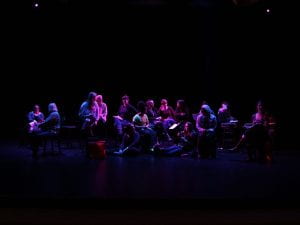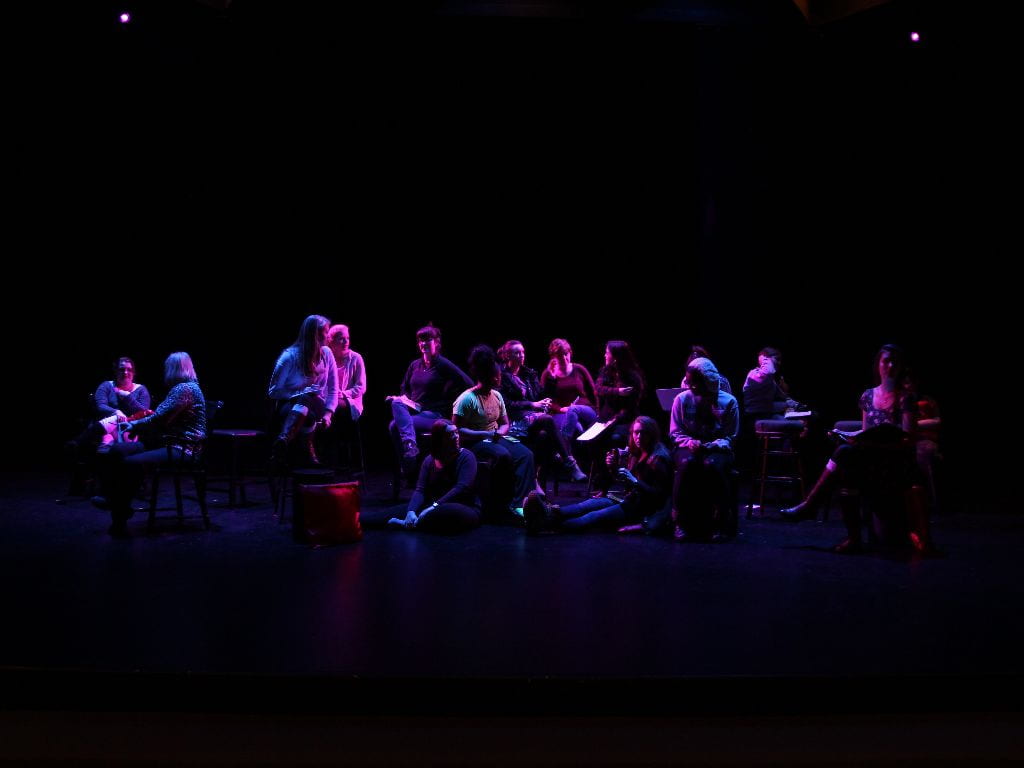BY MORGAN KING – COPY CHIEF
On Feb. 10-11, Centre College Feminists in conjunction with DramaCentre performed Eve Ensler’s The Vagina Monologues.
The Monologues are a collection of interviews from women with diverse backgrounds as recorded by Ensler. Some monologues are about a single woman, while others are pulled from the voices of many. Each highlights potentially sensitive questions asked by the average woman and allows them to be profiled on a stage in a way that is so honest, it is usually unavailable for women. The nature of the topics puts audiences of both men and women out of their comfort zone.
Centre’s production of The Vagina Monologues occurs every two years, and this year brought a stellar cast of women to repeat the interviews. The cast of 22 women was riveting to watch throughout their performances. Many of those involved are not usually involved in Centre’s Dramatic Arts program, making this performance more inclusive than most Centre productions.
Senior Tory Parker, one of the producers of the show, remarks that this inclusivity of the women on stage is one of her favorite things about The Vagina Monologues.
“The thing I love about The Vagina Monologues is that they really do bring women together,” Parker said. “There are women on the stage from every facet of Centre College life. There’s literally only one thing that ties us all together and it’s right there in the title of the show, but it’s enough!”

Parker noted that some of the more graphic content of the Monologues that is often overlooked in the public eye is meant to bring audience members out of their comfort zones.
“Sometimes the more graphic or annoying or terrifying or euphoric parts of being a woman get overlooked,” she said, “and even if this show tosses people out of their comfort zones it at least gives us a chance to explore those aspects of womanhood.”
The title alone is one that puts many people off, and the performances discuss “taboo” topics, but the main focus of the show is to bring the discussion of these topics to the forefront. It is a conversation that is important to have on all college campuses, with Centre being no exception.
“[This show] is important,” senior Ryley Swanner, one of The Vagina Monologues’ performers, said. “It brings people in on a topic that is often not discussed. We may talk about feminist topics, but not so directly as we do in this show.”
These topics include casual discussions of sex, beauty standards and homosexuality. One of the monologues in particular is the disturbing retelling of a rape of a Bosnian refugee.
Senior Maggie Kaus, another producer of the show, agrees that the importance of these topics to be discussed by men and women is the one of the main points of the show.
“My goal for this show is to help start conversations about the female experience,” Kaus said. “Women make up 50 percent of our population, yet there are very few critically renowned plays that help tell their experiences. I think it is very important to attend because there are so many different experiences and its just great to take the time to hear them.”
The producers of The Vagina Monologues asked for donations while attending the show to continue the conversation and to further help women in need. All of the money collected was donated to the Bluegrass Rape Crisis Center (BRCC), an organization in Central Kentucky dedicated to ending violence against women. In total the two nights of performances raised $420 for the BRCC.
Overall, our yearly performance of The Vagina Monologues claims topics that are deemed inappropriate for women to discuss openly and puts it all on a stage for men and women to view. On Centre’s campus, Parker hopes that this open discussion continues to improve.
“Most importantly, take something away from the experience. Think about your life or your vagina or the women you know more complexly, allowing all the faults and imperfections that come along with them,” she said. “Continue to feel comfortable sharing your experiences, because that’s how we learn to be better, safer, [and] more supportive communities.”
